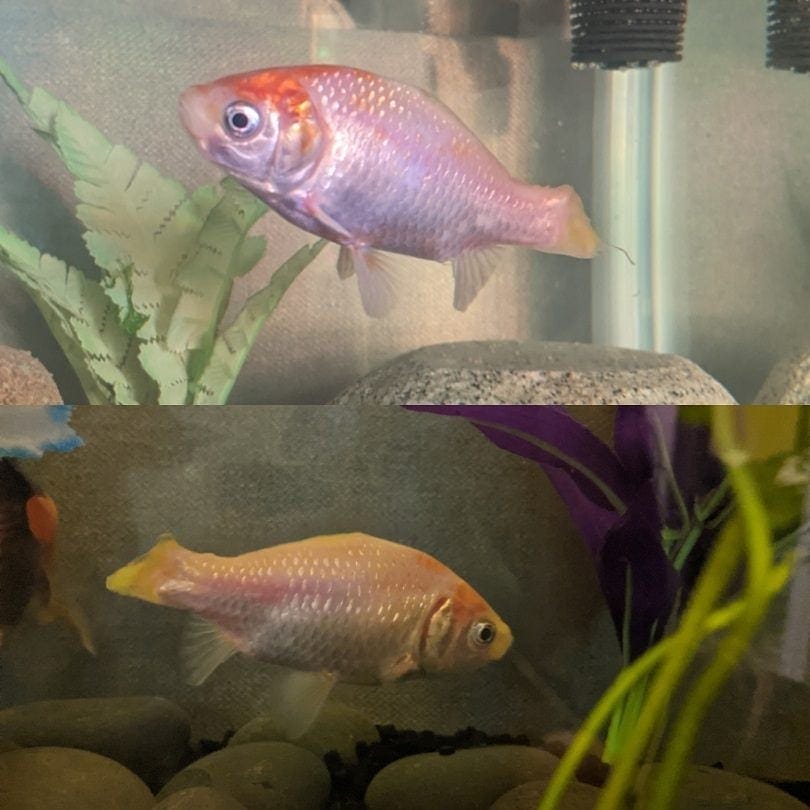Goldfish lose scales due to stress, poor water conditions, or infections. Addressing these issues can help prevent further loss.
Goldfish are popular pets known for their vibrant colors and easy care. Sometimes, owners notice their goldfish losing scales, which can be alarming. Several factors contribute to this problem, including environmental stress, water quality, and infections. Stress can arise from overcrowded tanks or sudden changes in water temperature.
Poor water conditions, such as high ammonia or nitrite levels, also harm goldfish. Infections from parasites or bacteria can lead to scale loss as well. Regular tank maintenance, proper water parameters, and prompt treatment of infections are crucial for keeping goldfish healthy and preventing scale loss.
Introduction To Goldfish Scale Loss
Goldfish are popular pets with their vibrant colors and graceful movements. Sometimes, goldfish may start losing scales. This can be concerning for any pet owner. Understanding why your goldfish is losing scales is crucial. This can help you address the issue promptly.
Common Signs Of Scale Loss
There are several signs to look out for if your goldfish is losing scales:
- Visible patches of missing scales
- Red or irritated skin
- Goldfish rubbing against objects
- Changes in swimming patterns
Potential Impacts On Goldfish Health
Scale loss can impact your goldfish’s health significantly. Here are some potential consequences:
| Impact | Description |
|---|---|
| Infections | Open areas can become infected easily. |
| Stress | Goldfish may experience increased stress levels. |
| Reduced Activity | Goldfish might swim less or hide more often. |
Addressing scale loss quickly is essential. This ensures your goldfish remains healthy and happy.
Anatomy Of Goldfish Scales
Goldfish scales play a crucial role in their health and protection. Understanding their anatomy can help identify why your goldfish might be losing scales.
Function And Structure
Goldfish scales are small, flat plates covering their bodies. These scales are made of bone and grow in layers. Each scale has a unique pattern, much like fingerprints in humans. They provide the fish with a streamlined shape for easy swimming. Scales also help the goldfish maintain balance and buoyancy in water.
Scales come in different types, including:
- Cycloid scales: Smooth and circular, common in most goldfish.
- Ctenoid scales: Have tiny, comb-like edges, less common in goldfish.
How Scales Protect The Fish
Goldfish scales serve as a protective barrier against injuries and infections. They shield the fish from harmful bacteria and parasites in the water. The scales also help prevent physical damage from rough surfaces and aggressive tank mates.
| Protection Aspect | Benefit |
|---|---|
| Barrier to Infections | Keeps bacteria and parasites out |
| Physical Protection | Guards against injuries and abrasions |
Scales are vital for a goldfish’s overall well-being. Any loss of scales can indicate underlying health issues. Observing your goldfish’s scales can provide clues about its health status.
Common Causes Of Scale Loss
Goldfish losing scales can be alarming for any pet owner. Understanding the causes can help in treating and preventing this issue. Let’s dive into some of the most common causes.
Physical Damage And Injury
Goldfish can lose scales due to physical damage or injury. They might bump into tank decorations or sharp objects. Aggressive tank mates can also cause harm. Ensure your tank is safe and free of hazards.
Poor Water Conditions
Poor water conditions can stress goldfish, leading to scale loss. Ammonia and nitrite levels should be zero. Regularly check and maintain water quality. Use a good filtration system to keep the water clean.
| Parameter | Optimal Range |
|---|---|
| Ammonia | 0 ppm |
| Nitrite | 0 ppm |
| Nitrate | Below 20 ppm |
| pH | 6.5 – 8.0 |
Parasitic Infections
Parasitic infections can cause goldfish to lose scales. Ich, flukes, and lice are common culprits. Look for signs like itching, rubbing against objects, and white spots. Treat the tank with appropriate medications.
- Ich: White spots on the body
- Flukes: Gills and skin irritation
- Lice: Visible tiny pests on the body
Regularly inspect your goldfish for these signs to catch infections early.

Credit: www.reddit.com
Environmental Factors
Goldfish can lose scales due to various environmental factors. These factors affect their health and well-being. Understanding these factors can help in preventing scale loss. Let’s explore these factors in detail.
Water Quality Parameters
Water quality is crucial for goldfish health. Poor water conditions can cause stress and scale loss. Keep the water clean and within the right parameters.
- pH Levels: Maintain a pH level between 7.0 and 8.4.
- Ammonia: Ammonia levels should be at 0 ppm. High ammonia is toxic.
- Nitrite: Nitrite levels should also be at 0 ppm.
- Nitrate: Keep nitrate levels below 40 ppm.
- Temperature: Maintain a temperature between 65°F and 75°F.
Regularly test the water to ensure these parameters. Use a quality testing kit.
Tank Size And Overcrowding
Tank size impacts goldfish health. A small tank can cause stress and scale loss. Overcrowding also leads to poor water quality and aggression.
Follow these guidelines for tank size:
- For one goldfish, a minimum of 20 gallons is needed.
- Each additional goldfish requires at least 10 more gallons.
Avoid overcrowding by following these tips:
- Provide enough space for each fish.
- Use proper filtration to maintain water quality.
- Regularly clean the tank to prevent waste buildup.
Ensure your goldfish have a stress-free environment. This helps in reducing the risk of scale loss.
Diet And Nutrition
Goldfish losing scales can often be traced back to their diet and nutrition. Ensuring your goldfish gets the right nutrients is crucial for its health and well-being.
Effects Of Malnutrition
A poor diet can lead to malnutrition in goldfish. Malnutrition can cause a variety of health problems. One of these problems includes losing scales. When a goldfish doesn’t get the right nutrients, its immune system weakens. This makes it more prone to infections and diseases.
Malnutrition can also cause stress in goldfish. Stress weakens their bodies, leading to scale loss. In severe cases, the fish might not survive. It’s important to provide a balanced diet to avoid these issues.
Choosing The Right Diet
Feeding your goldfish the right diet is key to its health. Goldfish need a mix of proteins, fats, and carbohydrates. Here is a simple table to guide you:
| Food Type | Benefits |
|---|---|
| Pellets | High in protein and essential nutrients |
| Vegetables | Rich in vitamins and fiber |
| Live/Frozen Food | Good source of protein and fats |
Pellets are a great staple food for goldfish. They provide essential nutrients and proteins. Be sure to choose high-quality pellets.
Incorporate vegetables like peas and spinach into their diet. These are rich in vitamins and fiber. They help keep the digestive system healthy.
Include live or frozen food like brine shrimp or bloodworms. These foods are excellent sources of protein and fats. Feeding them occasionally can boost your goldfish’s health.
A balanced diet ensures your goldfish remains healthy and vibrant. Avoid overfeeding to prevent health issues.
Diseases And Parasites
Goldfish losing scales can be a worrying sign. Often, it is due to diseases or parasites. Understanding these issues helps in taking the right steps to treat your goldfish.
Identifying Common Diseases
Several diseases can cause your goldfish to lose scales. Here are some common ones:
- Ichthyophthirius multifiliis (Ich or White Spot Disease): This disease causes white spots on the body.
- Fin Rot: This bacterial infection damages fins and scales.
- Columnaris: This bacterial disease appears as cotton-like patches on the skin.
Besides these, other infections might also cause scale loss. Check for symptoms and act quickly.
Treatment Options
Various treatments can help your goldfish recover. Here are some effective options:
- Quarantine: Isolate the infected fish to prevent spreading.
- Salt Baths: Use aquarium salt to treat infections.
- Medications: Anti-bacterial or anti-parasitic medicines can be effective.
Consult a vet for the best treatment plan. Always follow the instructions on medication packages.
Prevention is better than cure. Keep your tank clean and maintain good water quality. A healthy environment reduces the risk of diseases and parasites.
Prevention Strategies
Goldfish losing scales can be alarming. Implementing prevention strategies can help keep your fish healthy. Follow these strategies to ensure your goldfish remains vibrant and healthy.
Regular Tank Maintenance
Maintaining a clean tank is essential. Regular tank maintenance includes weekly water changes and removing debris. Use a water conditioner to neutralize harmful chemicals. Clean the filter every month. A clean tank prevents stress and disease.
| Task | Frequency |
|---|---|
| Water Change | Weekly |
| Filter Cleaning | Monthly |
| Debris Removal | Weekly |
Monitoring Fish Behavior
Observe your fish daily. Look for any unusual behavior. Monitor fish behavior to detect early signs of stress or illness. Signs include lethargy, loss of appetite, or erratic swimming. Early detection helps in taking prompt action.
- Check for lethargy
- Observe appetite changes
- Watch for erratic swimming
Quarantine New Fish
Before adding new fish to your tank, quarantine them. Quarantine new fish for at least two weeks. This prevents the spread of diseases. Use a separate tank for quarantine. Monitor the new fish for any signs of illness during this period.
- Set up a quarantine tank
- Isolate new fish for two weeks
- Monitor for signs of disease

Credit: www.hepper.com
When To Consult A Vet
Goldfish losing scales can be alarming. It’s important to know when to consult a vet. Acting quickly can save your fish’s life. Below are key indicators and steps to take.
Recognizing Severe Symptoms
Not all scale loss is a vet emergency. But some symptoms require professional help.
- Red or inflamed patches: This can indicate infection.
- Constant rubbing against objects: Your fish might be in pain.
- Open wounds: These are prone to dangerous infections.
- Rapid breathing: Your fish could be stressed or sick.
- Lethargy: A fish that doesn’t swim may be very ill.
Finding Specialized Aquatic Veterinarians
Not all vets treat fish. You need an aquatic specialist.
Start by searching online. Use keywords like “aquatic vet” or “fish veterinarian.”
Ask for recommendations from local pet stores. They often know good aquatic vets.
Check with your local aquarium. They usually have a vet they trust.
Here’s a quick table to summarize where to find specialized vets:
| Source | How to Find |
|---|---|
| Online Search | Use keywords like “aquatic vet” or “fish veterinarian” |
| Local Pet Stores | Ask staff for recommendations |
| Local Aquarium | Inquire about their vet services |
Once you find a vet, describe the symptoms clearly. Take photos if possible. This helps the vet understand the issue faster.
Recovery And Care
Seeing your goldfish lose scales can be worrying. But with proper care, they can recover. This section will guide you through the healing process and long-term care for your goldfish.
Healing Process For Scales
To help your goldfish heal, start by isolating it from other fish. This reduces stress and the risk of further injury. Place the goldfish in a clean, separate tank with fresh water.
Maintain the water quality by checking pH levels and ammonia. Keep the water temperature stable, ideally between 68-74°F (20-23°C). Poor water quality can slow down the healing process.
Provide a balanced diet rich in vitamins and minerals. High-quality fish food can boost immunity and speed up recovery.
Consider adding aquarium salt to the water. This can reduce stress and promote healing. Use one tablespoon of salt per five gallons of water.
Long-term Care For Scale Regrowth
Once your goldfish starts to recover, focus on long-term care. Ensure the tank is large enough for your goldfish. Overcrowded tanks can lead to stress and scale loss.
Regularly clean the tank and change the water. This prevents the buildup of harmful substances. Aim to change 25% of the water weekly.
Monitor the tank’s water quality with a testing kit. Keep the pH level between 6.5 and 7.5. Avoid sudden changes in water temperature.
| Care Aspect | Recommendation |
|---|---|
| Tank Size | At least 20 gallons for one goldfish |
| Water Quality | Stable pH and ammonia levels |
| Diet | High-quality food with vitamins |
| Water Temperature | 68-74°F (20-23°C) |
Provide hiding spots and plants in the tank. These reduce stress and offer a sense of security. Avoid sharp objects that can damage scales.
Monitor your goldfish’s health regularly. Look for signs of stress or illness. Early detection can prevent further scale loss.
By following these steps, your goldfish will have a better chance to regrow lost scales and stay healthy.

Credit: www.reddit.com
Conclusion
Understanding why your goldfish is losing scales is crucial for their health. Identifying the cause helps in providing proper care. Regular tank maintenance, a balanced diet, and monitoring your fish can prevent scale loss. Keep your goldfish healthy and stress-free for a longer, happier life.
Pay attention to their needs and environment.
